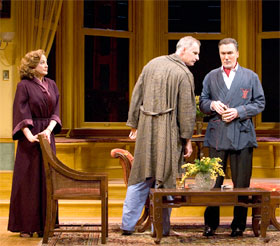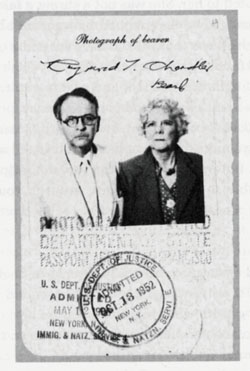In this week’s Wall Street Journal drama column I report from San Diego on the Old Globe‘s productions of The Pleasure of His Company and The Merry Wives of Windsor. Here’s an excerpt.
* * *
 Theatrical manners have changed greatly in the half century since “The Pleasure of His Company” opened on Broadway. Nowadays it’s an insult to call a play “well-made,” but back then you could still get away with setting a neatly crafted boulevard comedy in the drawing room of a home whose owners employed a butler. Not only did “The Pleasure of His Company” run for 474 performances, but it was later turned into a Hollywood movie that did just as well at the box office. Today, though, well-made comedies are as dead as drawing rooms, and the Old Globe’s revival of “The Pleasure of His Company” is the first time that the play has been on stage anywhere since the original production closed in 1959.
Theatrical manners have changed greatly in the half century since “The Pleasure of His Company” opened on Broadway. Nowadays it’s an insult to call a play “well-made,” but back then you could still get away with setting a neatly crafted boulevard comedy in the drawing room of a home whose owners employed a butler. Not only did “The Pleasure of His Company” run for 474 performances, but it was later turned into a Hollywood movie that did just as well at the box office. Today, though, well-made comedies are as dead as drawing rooms, and the Old Globe’s revival of “The Pleasure of His Company” is the first time that the play has been on stage anywhere since the original production closed in 1959.
To what do we attribute this act of dramatic archaeology? The credit goes to Darko Tresnjak, the Old Globe’s resident artistic director, who has a taste for American stage comedies of the ’50s that you wouldn’t expect from a director born in Yugoslavia. “I find that underneath the glossy surfaces, the subtext [of these plays] is actually quite subversive,” he told James Hebert of the San Diego Union-Tribune earlier this month. Last year Mr. Tresnjak revived John van Druten’s “Bell, Book and Candle,” a quintessential example of the genre. Alas, I didn’t see that production, but if was half as stylish as this one, it must have been terrific….
Biddeford “Pogo” Poole (Patrick Page), the star of “The Pleasure of His Company,” is an ascot-wearing socialite-sportsman who walked out on Katharine (Ellen Karas), his ex-wife, and Jessica (Erin Chambers), his only daughter, to become (in Katharine’s exasperated phrase) a “globetrotting heel.” Years later he shows up on Katharine’s doorstep just in time for Jessica’s wedding, determined to charm his way into Jessica’s heart–and, if possible, Katharine’s bed. That Katharine has married again, this time to a rich, dull San Francisco businessman (Jim Abele), means nothing to Pogo, who uses his charm as an offensive weapon and is in the habit of having his own way, no matter what it costs or whom it hurts.
The part of Pogo was created on Broadway by Cyril Ritchard and played on screen by Fred Astaire, which will give you a pretty good idea of what it takes to make “The Pleasure of His Company” fly. (This is the sort of play in which lines like “I dug out some of the ancestral bourbon” and “Morality is merely low blood pressure” are tossed off between drinks.) The good news is that Mr. Tresnjak and the Old Globe have got every bit of what it takes. Not only does Mr. Page waltz through his part with the utmost suppleness and urbanity, but his supporting cast keeps him all the way up on his toes…
Across the courtyard in its attractive outdoor pavilion, the Old Globe is performing “The Merry Wives of Windsor” as part of a three-play Shakespeare festival that also includes “All’s Well That Ends Well” and “Romeo and Juliet.” Paul Mullins has staged “Merry Wives” in the manner of a Hollywood Western, turning Falstaff (Eric Hoffmann) into a Yosemite Sam-type blowhard equipped with a pair of six-shooters and a 20-gallon hat. This isn’t the first time I’ve seen a Shakespeare comedy transplanted to the Wild West–the Hudson Valley Shakespeare Festival did “As You Like It” in much the same way last season–and some of the actors, Mr. Hoffmann in particular, skate casually atop Mr. Mullins’ directorial conceit instead of breaking through the ice and plunging into deeper comic waters. Still, there’s plenty of uncomplicated pleasure to be found in this thoroughly agreeable production…
* * *
Read the whole thing here.
Archives for August 1, 2008
TT: Hearing is believing
 Only one recording of Raymond Chandler’s speaking voice survives, a BBC interview conducted with Chandler in 1958 by none other than Ian Fleming. You can listen to it by going here. If you do so, you’ll be staggered to learn that the creator of Philip Marlowe sounds…well, wimpy.
Only one recording of Raymond Chandler’s speaking voice survives, a BBC interview conducted with Chandler in 1958 by none other than Ian Fleming. You can listen to it by going here. If you do so, you’ll be staggered to learn that the creator of Philip Marlowe sounds…well, wimpy.
I mention this fact because I’ve long been fascinated by recordings of the voices of famous writers and other artists, many of which I find to be personally revealing in ways that no other documentary evidence can equal. The BBC has a vast archive of recordings as rare and illuminating as the Chandler interview, but until recently it sat firmly on them. Now the British Library Sound Archive has started releasing a series of spoken-word CDs drawn from the BBC archives, the first five volumes of which are devoted to W.H. Auden, Graham Greene, George Bernard Shaw, Evelyn Waugh, and H.G. Wells.
Yep, you guessed it: I’ve written a “Sightings” column for tomorrow’s Wall Street Journal about the great spoken-word recordings of the twentieth century, only a handful of which have made it to CD. I suspect you’ll find the column frustrating, since I devote most of it to telling you about amazing things that you can’t hear unless you go to a very well-stocked record library, but I think it’ll interest you anyway.
If you’re curious, pick up a copy of Saturday’s Journal and see what I have to say.
UPDATE: Read the whole thing here.
TT: Almanac
“Each man is questioned by life; and he can only answer to life by answering for his own life; to life he can only respond by being responsible.”
Viktor E. Frankl, Man’s Search for Meaning
